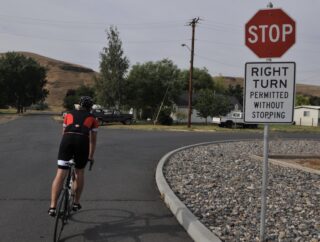
Some intersections in Oregon already allow bicycle riders to “slow-and-go”.
(Photo: Jonathan Maus/BikePortland)
10 years after it was last debated in the Oregon Legislature, a concept known as “Idaho Stop” has once again found its way into a bill. And it passed its first committee vote yesterday, just hours before a key legislative deadline.
Senate Bill 998 wasn’t on anyone’s radar before last week. Up until then it was just a vague placeholder bill without any detailed language and with no amendments. That changed when Senator Floyd Prozanski (D-Eugene) drafted an amendment and brought it to the Senate Judiciary Committee during a public hearing for the bill on Monday.
The bill would allow a bicycle user to treat intersections with stop signs or red flashing signals as yields. In other words, as a bicycle user, you’d be able to roll through these intersections without stopping — but only when/if it was safe to do so.

At Monday’s hearing, Committee Vice-Chair Sen. Prozanski said it’s merely a “re-do” of a bill he sponsored and passed as a member of the Oregon House of Representatives in 2003.
“This bill would follow a law out of Idaho that has been in place for over 35 years,” Prozanski said at the hearing.
“This is one of those situations where I believe, that’s what a lot of people do already with their bikes.”
— Senator Kim Thatcher, Judiciary Committee vice-chair
Only one person testified. A man who said he’s a work zone flagger told lawmakers he’s opposed because, “A lot of bicyclists go right on through” his work zones and he believes it’s a “safety risk”. “It’s bad enough we got boxes in Portland for bicyclists before the cars and they disrespect us,” the man said.
When the bill was brought back to committee for a vote yesterday, Senator Kim Thatcher (R-Keizer) added an amendment clarifying that bicycle users must stop for flaggers.
Committee Vice-Chair Thatcher is in favor of the law. “Just like a few years ago when we told ODOT we wanted to raise speed limits in some areas,” she explained, before logging her “yes” vote, “People were already going those speeds. This is one of those situations where I believe, that’s what a lot of people do already with their bikes.” Sen. Thatcher pointed out that — unlike a car — human-powered vehicles are “really difficult to stop completely and then get going again.”
(Video below by Portlander Spencer Boomhower explains how Idaho Stop works)

Thanks for reading BikePortland.
Please consider a $10/month subscription or a one-time payment
to help maintain and expand this vital community resource.
Senator Shemia Fagan (D-Portland) also voted in favor of the bill. Sen. Fagan shared that she understands the benefits of the bill because she used to commute to law school by bike. “Things that are in motion tend to stay in motion, things that are at rest tend to stay at rest,” she said. “Anything we can do to encourage people to get out of their cars and ride a bike is a good thing.”
Senator Cliff Bentz (R-Ontario) was the sole “no” vote. After admitting he’s rolled through stop signs on his own bike, Bentz said he opposes the law because of concerns expressed by sheriffs in his district.
The bill passed committee 6-1. It will now move to the Senate floor for a vote.
Reached on the phone this morning, Sen. Prozanski said he introduced the bill after a constituent contacted him late last month (Idaho Stop was also one of the bills I mentioned in an op-ed on March 15th). Since he had a placeholder bill to study violations, he was able to draft the language and move it to a vote very quickly. “At this point, I think it has a very good chance of passing the full Senate,” Prozanski said. Once it goes to the House Judiciary Committee, he plans to meet with members and find a sponsor.
Asked why he is such a fan of Idaho Stop, Prozanski recalled his 2003 discussions with the captain of the Boise Police Department. “He said it’s just much more seamless and it makes traffic flow more easily… It’s not as much of a hazard as coming to a complete stop and trying to start when you have other vehicles moving around you and you’re trying to get started and through an intersection with enough time,” he added.
Sen. Prozanski added that, “It seems to me we have enough safeguards in place to allow continual motion when right-of-way is clear.”
As for why the bill failed in 2003, Prozanski said it would have passed were it not for one senator (former Senator John Minnis) who simply didn’t like the bill and wouldn’t give it a vote.
When it was proposed again in 2009 by former House Rep. Jules Bailey — with the full backing of The Street Trust (then Bicycle Transportation Alliance) — the bill failed for several reasons: Irresponsible and biased coverage from The Oregonian and other outlets made it controversial; a high-profile firing of The Street Trust lobbyist in charge of the bill scared off some lawmakers; and some advocates blamed legislators who sought revenge against bicycle bills after being strongly criticized for their support of a mandatory bicycle registration bill.
The Street Trust isn’t working SB 998, but as OPB reported yesterday, they are supportive of it.
Idaho was the first state to adopt a statute like this. Arkansas just passed a version of the law last week.
— Jonathan Maus: (503) 706-8804, @jonathan_maus on Twitter and jonathan@bikeportland.org
Never miss a story. Sign-up for the daily BP Headlines email.
BikePortland needs your support.
from BikePortland.org http://bit.ly/2GdGvAu


No comments:
Post a Comment